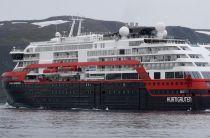South Orkney Islands Antarctica
Cruise Port schedule, live map, terminals, news
Region
Arctic - Antarctica
Local Time
2025-04-13 17:11
 31°F
31°F -0.8°C

 Strong breeze
Strong breeze11.2 m/s
 31 °F / -0 °C
31 °F / -0 °C 26 °F / -3 °C
Port South Orkney Islands Antarctica cruise ship schedule shows timetable calendars of all arrival and departure dates by month. The port's schedule lists all ships (in links) with cruises going to or leaving from South Orkney Islands Antarctica. To see the full itineraries (ports of call dates and arrival / departure times) and their lowest rates – just follow the corresponding ship-link.
| Day | Ship | Arrival | Departure |
|---|---|---|---|
| 30 December, 2025 Tuesday |
South Orkney Islands are located in the Southern Ocean, approximately 604 km (375 miles) north-east of the tip of Antarctic Peninsula. The group of islands have a total area of around 620 km2 (240 ml2). South Orkney are claimed both by Argentina (as part of Argentine Antarctica) and by UK as part of British Antarctic Territory since 1962 (earlier as Falkland Islands Dependency). Sovereignty claims are held in abeyance under 1959 Antarctic Treaty.
Both Argentina and Britain maintain bases on South Orkney Islands. Orcadas, the Argentinian base, was established 1904 on Laurie Island. The eleven buildings of Argentinian station shelter up to 45 people during summer, and around 14 during winter. Signy Research Station, the British Antarctic Survey base, is situated on Signy Island. It was established in 1947 and initially operated year-round. However, since 1995-1996 the station has been open just from November through April each year (during southern hemisphere summer). Apart from bases' personnel, there are no permanent inhabitants on South Orkney Islands.
South Orkney group of islands were discovered by two sealers in 1821, the American Nathaniel Brown Palmer (1799-1877) and the British George Powell (died 1823). Originally, the Islands were named Powell's Group, and the main island was named Coronation Island because it was the year of coronation of King George IV. James Weddell visited the Islands in 1823 and gave the archipelago its current name (after Orkney Islands, Scotland) and renamed some of the isles. South Orkney Islands are situated at almost the same latitude south as Orkney Islands are north, although it is not known if this fact was a factor behind the islands' naming.
In 1908, the UK declared sovereignty over variety of South American and Antarctic territories "to the south of the 50th parallel of south latitude, and lying between the 20th and the 80th degrees of west longitude", including South Orkney Islands. The Argentinian claim dates from 1925. Originally, it was justified by Argentinian occupation of Laurie Island base and afterwards subsumed into wider territorial claim.
South Orkney Islands include 4 main islands (Coronation, Laurie, Powell, Signy), also Robertson Islands, Saddle Islands, Acuña Island, Inaccessible Islands. Coronation Island is the largest and itss highest elevation point is Mt Nivea (4153 ft / 1266 m above sea level).
- Cruise Industry

Hurtigruten returns to Antarctica with MS Fram and MS Roald Amundsen
The world’s largest expedition cruise company Hurtigruten returns to Antarctica with the battery-hybrid powered ships MS Fram and MS Roald...
October 3, 2021 - Cruise Industry

Hurtigruten Guests to Experience a Solar Eclipse
In December 2021, sustainable expedition cruise ship operator Hurtigruten is offering its guests the opportunity to experience the solar eclipse from...
January 16, 2020 - Cruise Industry

Witness 2021 Solar Eclipse Aboard Akademik Ioffe
Eclipse Travel (AU-based tour operator) announced an unique solar eclipse themed cruises scheduled for 2021. The Antarctica voyage will be on the...
May 18, 2018 - show more news
